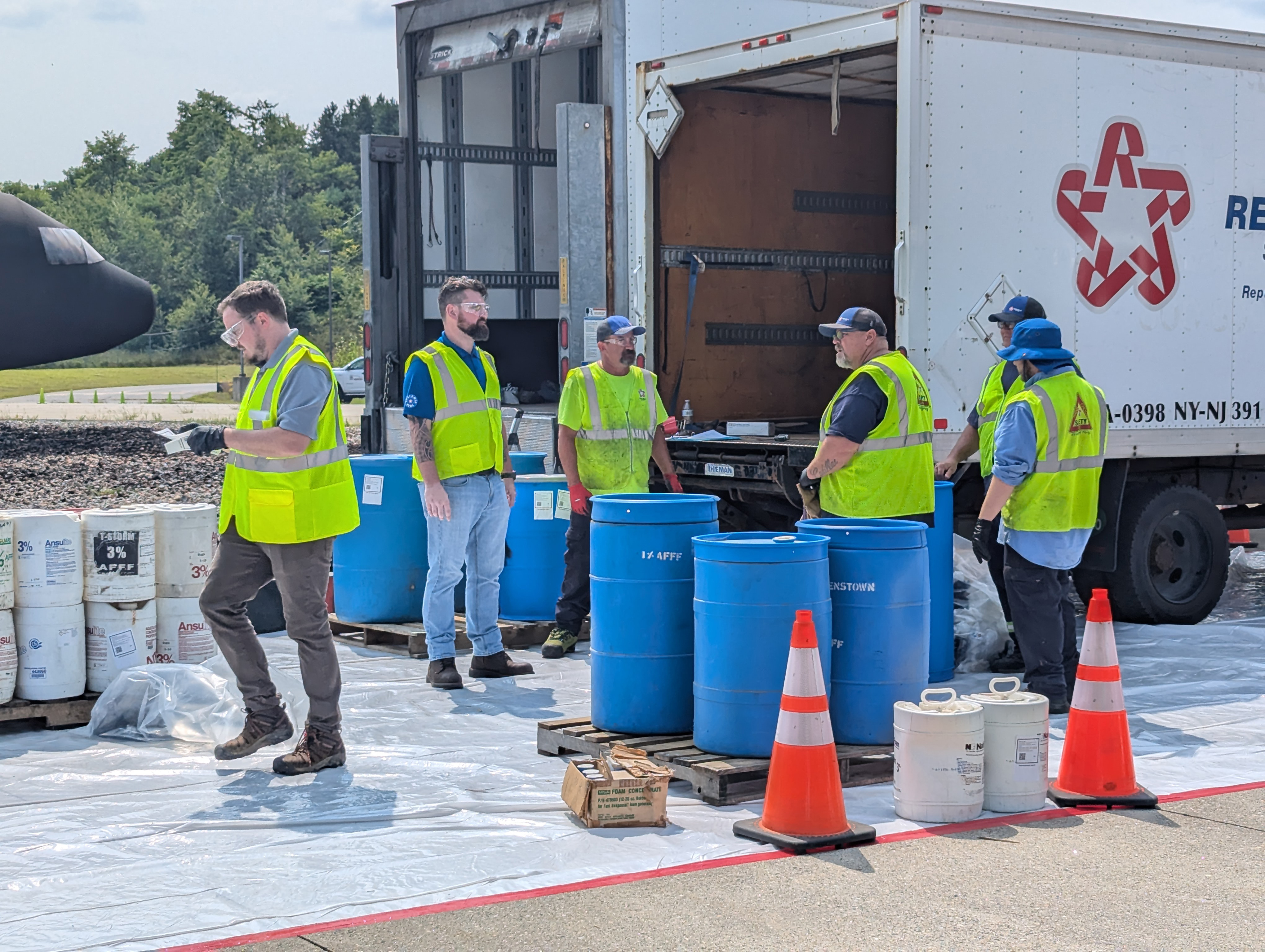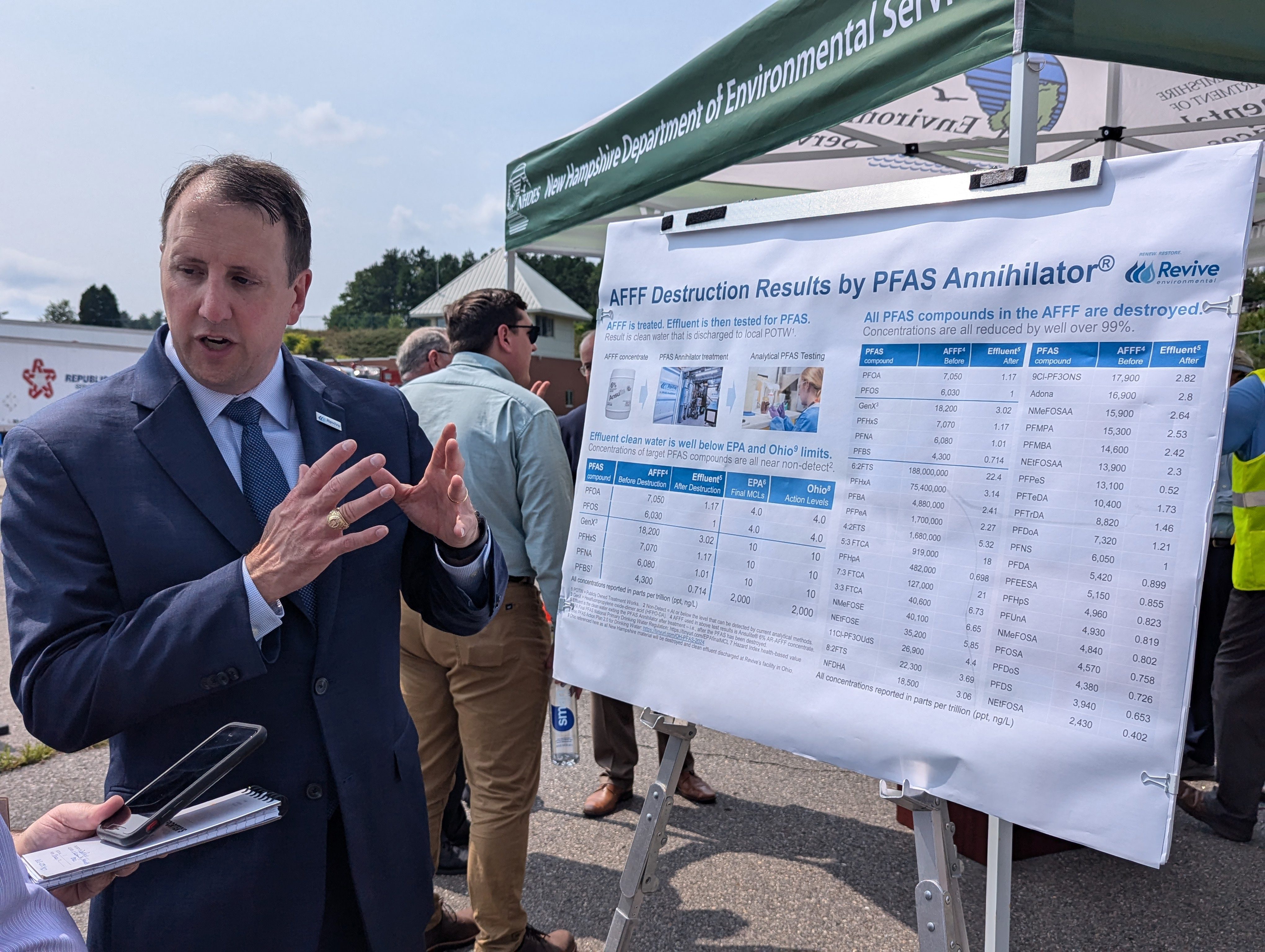Organizations to collect foam from fire departments, airports
Alan Robidas was grateful as his team prepared containers of firefighting foam at the New Hampshire Fire Academy to be collected and destroyed. The foam, long used by firefighters nationwide to extinguish fires, was silently at risk of harming crews for decades, he said.
“It’s been a long time coming,” said Robidas, a captain in the Concord Fire Department. “It’s been pretty helpful that the state of New Hampshire has worked with area fire departments to finally give us an opportunity to get rid of this stuff. … Some of the effects of PFAS are really invisible until they’re not.”
Robidas was referring to carcinogenic or cancer-promoting effects, stemming from PFAS — per- and polyfluoroalkyl substances. PFAS has been a component of aqueous film-forming foam (AFFF) used at fire departments and airports starting in the 1970s. Now, the New Hampshire Department of Environmental Services (NHDES) and state Fire Mashal are working with company Revive Environmental to help departments and aviation facilities across the state remove it, via the AFFF Take Back Program.
The initative aims to remove more than 100,000 gallons of unused PFAS-contaminated foam.
“We currently have close to 10,000 gallons,” Fire Marshal Sean Toomey said of the ongoing collection. “For us to be able to get rid of about 100,000 gallons is huge; it helps over 100 fire departments in New Hampshire, about half of our departments, get rid of the foam at no cost.
Revive, a Columbus, Ohio-based business, specializes in eliminating PFAS with its PFAS Annihilator process to convert materials containing the substances into clean water, which is then discharged to public-owned water treatment facilities. The state’s contract with the company is just over $1 million, while NHDES estimates each gallon costs $42 to collect.
“We still want to use the water, but you have to take the PFAS out,” said Revive President and CEO David Trueba, explaining previous attempts to remove the carcinogens from foams.

Workers prepare to load barrels of aqueous film-forming foam (AFFF) containing PFAS onto a truck heading to Revive Environmental at an AFFF Take Back event at the NH Fire Academy in Concord on Aug. 13. (Photo by Trisha Nail)
“Carbon is used just like a water filter to take the PFAS out, and then (the water) is reusable. That carbon gets exhausted, and right now they’re putting it in landfills. Not awesome, because the PFAS is still around.”
Revive’s treatment takes AFFF concentrate and uses a process called supercritical water oxidation (SCWO), developed by science institute Battelle, to destroy PFAS remnants on carbon in the foam, according to NHDES, avoiding the potential for transferring those substances into the environment.
The program kicked off with an event in Nashua on Aug. 6 and is running other public events in New Hampshire communities through August. Those included at the Aircraft Rescue Training Facility at the state fire academy in Concord on Aug. 13, where 13 fire departments dropped off about 2,000 gallons of foam containing PFAS, said Andy Gould, of the NHDES Hazardous Waste Management Bureau.
At the training facility, Trueba and state officials championed the program as firefighters loaded AFFF barrels to be taken to Ohio for destruction. Revive is contracting Republic Services and Northeast Purification Systems to collect the foam.
PFAS first appeared on the state’s radar in 2014 when it was found in a drinking water well at the Pease Tradeport in Portsmouth, referenced by NHDES Commissioner Robert Scott to open the Concord event.
“This has been a 10-year journey for the department since we discovered PFAS,” Scott said, speaking to a small crowd of Revive leaders, state employees and reporters. “We’re really proud to be implementing this program to assist our firefighters’ service in removing these contaminants in our communities.”
New Hampshire’s work to tackle the issue began in 2019 when the Legislature directed NHDES to implement the AFFF Take Back Program. NHDES took inventory of legacy AFFF stock at fire departments in June 2022 ahead of its contract with Revive formed last year.

Revive Environmental President and CEO David Trueba explains the efficacy of his company’s PFAS Annihilator against PFAS compounds, converting AFFF into clean water within legal limits.” (Photo by Trisha Nail)
Trueba prided New Hampshire on its efforts, saying his company would destroy the mass collection of PFAS from the state through the next six months.
“There are tools to diffuse (AFFF) that are safe,” Trueba said. “New Hampshire has taken a leadership effort to get the right tools in the right hands of our firefighters and first responders, and in that journey, eliminate the potential hazard and risk of contamination for nature.”
The program coincides with new federal requirements for airports like Manchester-Boston Regional Airport (MHT) to stop using AFFF. The airport delivered about 800 gallons of AFFF to be eliminated by Revive, according to MHT Director Ted Kitchens.
“Airports such as Manchester-Boston have been required by the Federal Aviation Administration to provide aircraft rescue and firefighting services using AFFF that contains PFAS and that meets military specifications,” Kitchens said at the event.
“In the fiscal year 2020, in the National Defense Authorization Act, Congress mandated the U.S. Navy to establish new military specifications for fluorine-free firefighting agents and phase out the use of AFFF starting in October 2023.”
He said the Department of Defense has since approved three fluorine-free foams for aircraft firefighters to use, including one earlier this month.
The AFFF Take Back Program is available to all fire departments around the state, local governments and government-owned airports with Class B AFFF foam but not private entities. The state will not reimburse departments for dropping off AFFF substances. Organizations with questions on eligibility may contact NHDES at 603-271-6424 or email andrew.m.gould@des.nh.gov.